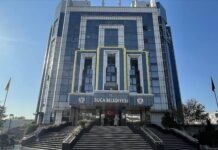Turgay Doğan, an ailing inmate at a prison in Turkey’s capital of Ankara, remains incarcerated despite fulfilling parole requirements including completing the minimum required portion of his sentence and being recognized for good behavior, the Bold Medya news website reported.
Doğan has recently been hospitalized and is currently suffering from pancreatitis and blood poisoning (sepsis). He has been on intravenous feeding due to severe abdominal pain, with no clear timeline for his discharge from the hospital.
Doğan was arrested in the aftermath of a 2016 coup attempt and sentenced to eight years, nine months in prison due to his alleged affiliation with the faith-based Gülen movement based on witness testimony. His case is currently under review by the European Court of Human Rights, where he has appealed on grounds of human rights violations.
Turkish President Recep Tayyip Erdoğan has been targeting followers of the Gülen movement, inspired by Turkish Muslim cleric Fethullah Gülen, since the corruption investigations in 2013, which implicated then-prime minister Erdoğan, his family members and his inner circle.
Dismissing the investigations as a Gülenist coup and conspiracy against his government, Erdoğan designated the movement as a terrorist organization and began to target its members. He intensified the crackdown on the movement following an abortive putsch in July 2016 that he accused Gülen of masterminding. Gülen and the movement strongly deny involvement in the coup attempt or any terrorist activity.
The prison’s administrative observation board denied Doğan’s parole, citing his alleged failure to cooperate with the board as the reason for the decision. Although his good behavior was noted in the report, the board scheduled a re-evaluation in three months.
Administrative observation boards, review bodies established in Turkish prisons in January 2021, have been delaying the parole of prisoners by three to six months, raising concerns over multiple rights violations.
Between 2021 and 2023 the release of a total of 384 prisoners eligible for parole was postponed, according to data from the Human Rights Association (İHD).
The decision has significantly impacted Doğan’s family. His wife, Kübra Doğan, and their 9-year-old daughter were particularly affected. She described her daughter’s disappointment during a recent school event, which the girl had hoped her father would attend following his expected release.
His wife has called on the authorities to reconsider their decision, emphasizing the hardship her husband has endured. “My husband was arrested during his recovery from cancer. I do not want his health to deteriorate again,” she said.
As part of a crackdown launched by Erdoğan in the aftermath of the attempted coup on July 15, 2016, Turkey jailed tens of thousands of people on terrorism-related charges. Most of them were merely critical of the government and had not engaged in any criminal activity.
Although victims can include people detained or imprisoned on any grounds, several documents in recent years have indicated that the abuses are more pervasive and systematic when it comes to people imprisoned on political grounds such as their alleged ties to political and civil networks not approved of by the government.















